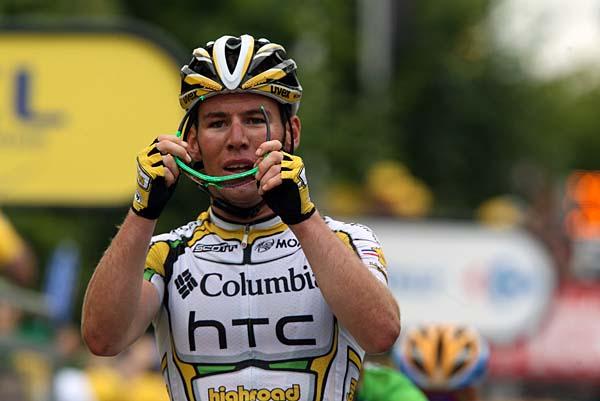Tour stage paralyzed by radio-free day
Riders busy doing nothing at all (almost)

In many aspects, today's Tour stage wasn't about Mark Cavendish winning his third stage of the race, or his seventh career Tour stage, or his increasingly baffling victory salutes. Instead today's story revolved around the UCI's and ASO's directive to ban radios and the reaction of the teams to the experiment being conducted by the sport's biggest stakeholders.
Would we see an exhilarating exhibition of racing as the Tour brought viewers back to a golden age of cycling before technology transformed riders into robots? Would the racers have to think for themselves? Would a pandemic of confusion sweep through the French countryside as rider after rider veered off into ditches, unable to function without the orders of 'straight, no straighter, that's it. Turn now, turn more. Good. Good turning,' from the team car?
No, in all seriousness, what we saw in the end was a defiant 'no' from the teams. They did not go as far as to stop at the roadside in protest, but perhaps through fear or through apathy waged an impromptu 'go-slow' which was the polar opposite of the radio ban's intent.
Importantly, according to one commentator, they seemed to forget that although the radios weren't switched on, plenty of viewers and spectators were still tuning into live coverage around the world.
Cycling commentator Phill Liggett said: "It was like going back 20 years to when the peloton would ride piano all day. The riders we spoke to said that there wasn't a 'go slow' but they didn't seem to want to race. I think the sprinters were happy to go slow but it was a shame."
Before the start, teams promised to race rather than stage a protest as had been rumoured during the rest day. "We're not striking. That would be childish," were the level-headed words from Bob Stapleton in Limoges. And to be fair he was correct. The ever-present Bernhard Eisel tapped out a strong tempo at the front of the bunch, almost single-handedly holding the break at bay before the Columbia train whipped into action for what was an exciting finish with an uphill kick not best suited to the Manx express.
"We have to respect the authority of the UCI and the race organiser. But the potential for mistakes is high today and that's unnecessary. I'd hate to see a rider's Tour totally screwed up because a car couldn't get to him. That could happen. I'm concerned with a lack of procedure for taking care of flats and crashes. This has not been well implemented, there's no written plan," said Stapleton.
Get The Leadout Newsletter
The latest race content, interviews, features, reviews and expert buying guides, direct to your inbox!
With less than 20 kilometres to go Stapleton conceded that the lack of radio communication had been a factor in the day's racing: "There aren't many sprints left so for some riders there's a lot of common interest for many of the sprinters today. This is a chance for them to come out and win.
"Today is probably a combination of people not wanting a break to get too far ahead and, yes, a third factor is that the teams are unhappy with experimenting in the Tour. For some teams the Tour is the only chance to shine on a global stage."
One source at Liquigas admitted that there was a premeditated plan for riders to put on a staged show, although he didn't disclose which teams were involved, by throwing two riders to the front of the bunch once the break escaped, but without full-on racing ever commencing.
However the last word went to Stapleton, whose top sprinter brought the stage to life. "I don't think it's been an exciting day but you saw an exciting finish and viewers were rewarded for their patience."
Daniel Benson was the Editor in Chief at Cyclingnews.com between 2008 and 2022. Based in the UK, he joined the Cyclingnews team in 2008 as the site's first UK-based Managing Editor. In that time, he reported on over a dozen editions of the Tour de France, several World Championships, the Tour Down Under, Spring Classics, and the London 2012 Olympic Games. With the help of the excellent editorial team, he ran the coverage on Cyclingnews and has interviewed leading figures in the sport including UCI Presidents and Tour de France winners.
